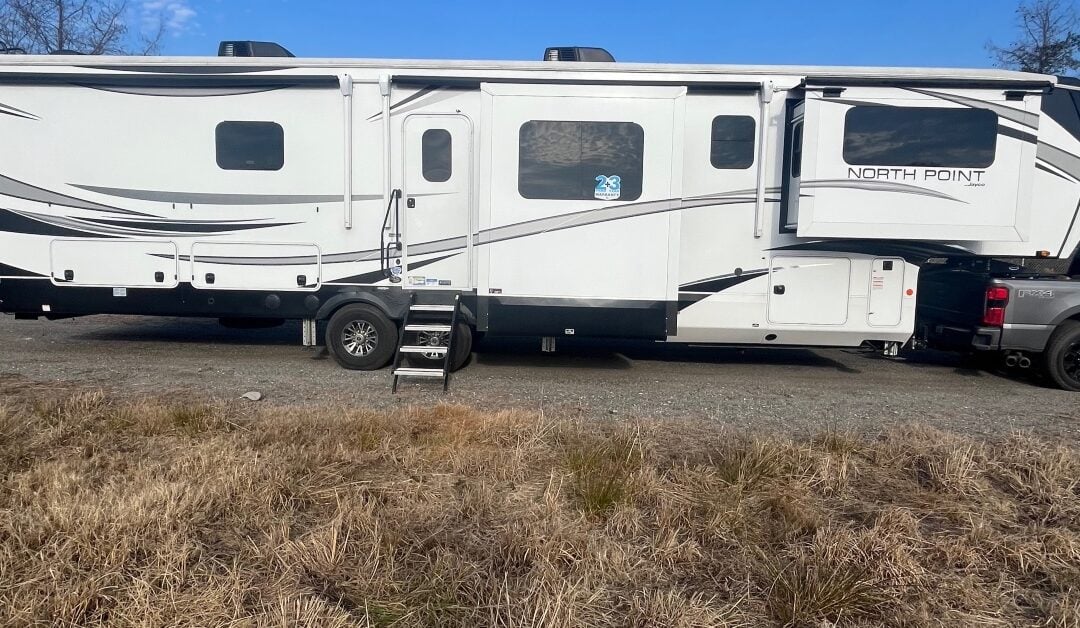Think you know everything there is to know about RVs? Chances are, there’s still something to learn. This week, we’re exploring the different types of RV classes—so you can figure out which one is right for your next camping trip!
This post will take a look at Class A, Class B and Class C motorhomes, as well as fifth wheel trailers and travel trailers. We’ll help you decide which one is best for your needs and give you a few tips on what to look for when purchasing your own RV. So, pull up a chair, and let’s get started!
Types Of RVs
Before discussing the different classes of RVs, it’s important to understand that there are two different types of RVs: motorized and towable.
Motorized RVs are, as the name suggests, RVs that come with their own motor and can be driven without being attached to another vehicle. The most common type of motorhome is the Class B RV. Motorized RVs include Class A, B, and C motorhomes—which we’ll discuss in more detail below.
Towable RVs, on the other hand, are trailers that must be towed behind a vehicle. The most common types of towable RVs are travel trailers and fifth-wheel trailers, which we’ll also discuss in more detail below.
Now, let’s dig into the various classes a little more to give you a clearer sense of which one might be best for you.
Motorhome RV Classes

Motorhomes come in three levels: Class A, Class B, and Class C. Each of these classes offer different features, so it’s important to choose the one that best fits your needs.
Class A RV
Class A RVs are the largest and most luxurious of the motorhome options. They’re often called “bus conversions” because they’re built on a bus chassis. Class A RVs typically come with all the bells and whistles, like multiple slide-outs, full kitchen and bathroom facilities, and plenty of storage space.
Class A RVs can vary in length from 20 to 45 feet, with some of them sleeping up to eight or ten people. These motorhomes run on diesel or gasoline, and either way, they have a high fuel cost. And because they are so big and hefty, they aren’t the most fuel-efficient – some achieve as little as six miles per gallon!
This RV Class is commonly used by families and full-time RVers. So it’s perfect if you’re looking for a home away from home on wheels that can accommodate all your needs.
Class B RV
Class B motorhomes are also called “camper vans,” and they’re the smallest of the motorhome options. They’re built on a van chassis, which means they’re easy to drive and park. Class B RVs typically have kitchenettes and bathroom facilities, and sleeping areas. Some even come with a small living area.
Class B RVs range in length from 16 to 20 feet, with some of them sleeping up to four people. These RVs usually run on gasoline, making them more fuel-efficient than other classes of motorhomes. They typically get around 20 miles per gallon.
A class B motorhome is perfect for couples or small families who are looking for a more compact option that’s easy to drive and maneuver.
Class C RV
Class C motorhomes are also called “mini-motorhomes.” They’re somewhere between Class A and B RVs in terms of size. They’re built on a truck chassis, which means they have better towing capacity than Class B RVs. Class C RVs typically have kitchenettes and bathroom facilities, and sleeping areas. Some even come with a small living area.
Class C RVs range in length from 20 to 35 feet, with some of them sleeping up to eight people. These RVs usually run on gasoline or diesel, making them less fuel-efficient than Class B RVs. But they typically get around 12 to 15 miles per gallon.
This RV Class is perfect for families or groups of friends who are looking for a more spacious option that’s still easy to drive and maneuver.
Towable RV Classes

The first thing you should know about towable trailers is that they all require a separate tow vehicle, and usually a fairly powerful one. To move a big trailer or fifth-wheel trailer, you’ll almost certainly need at least a half-ton truck, and perhaps a one-ton truck, to do it securely. This is why many people choose a motorhome instead—they don’t need to worry about towing a separate vehicle.
Now, let’s take a look at the different types of towable RVs:
Pop-up RV Trailers
Pop-up trailers are tiny yet need to be unfolded physically before they can be used. Pop-up trailers have limited culinary and sanitary resources, although they do include sleeping areas. Pop-up trailers are a good option if you are looking for an RV that is easy to store and transport.
Travel Trailers
This is the most popular type of RV, as they come in a wide range of sizes, prices, and styles. You can find small travel trailers that are easy to tow and maneuver or large luxury models that come with all accessories and fittings.
Fifth Wheel Trailers
A fifth-wheel trailer is a bit more difficult to tow than a travel trailer, but it offers more space and amenities. Fifth-wheel trailers are also easier to attach and detach from the tow vehicle.
Toy Haulers
A toy hauler is a type of RV that is designed to transport large items, such as motorcycles, ATVs, or even boats. Toy haulers typically have a large storage area in the back for these items.
Truck Campers
A truck camper is a type of RV that attaches to the bed of a pickup truck. Truck campers are typically small and basic, but they offer a lot of flexibility in terms of where you can go and what you can do.
6 Things To Consider When Choosing An RV Class

Now that you know the different types of RV Classes, here are six things to consider when choosing the right one for you:
Living Space
How much space do you need? Do you want a compact option that’s easy to drive and maneuver or a more spacious option with all the bells and whistles?
Budget
How much can you afford to spend on an RV? Class A RVs tend to be the most expensive, while Class B and C RVs are typically less expensive. Towable trailers also range widely in price.
Purpose
Why do you want an RV? Are you looking for a vacation home on wheels, or do you just need something to sleep in while camping? If you’re looking for a more versatile option, you might want a toy hauler or truck camper.
Towing Capacity
If you’re considering a towable RV, you need to make sure your vehicle has enough towing capacity. Pop-up trailers and travel trailers can typically be towed by most SUVs or trucks, but fifth wheels and toy haulers will require a more powerful vehicle.
Fuel Efficiency
Class A RVs are typically the least fuel-efficient, while Class B and C RVs are usually more fuel-efficient. If fuel efficiency is important to you, keep this in mind when choosing an RV Class.
Size Restrictions
Some campgrounds have size restrictions on RVs, so be sure to check before you book a spot. Class A and C RVs are usually too large for most campgrounds, while Class B RVs and smaller towable trailers should be fine.
Popular Questions about RV Classes
Q: What is the difference between a Class A, B, and C RV?
A: The main difference between Class A, B, and C RVs is size. Class A RVs are the largest and most luxurious, while Class B and C RVs are smaller and more compact.
Q: Which RV Class is the best for families?
A: It depends on your family’s needs. If you have a large family or need a lot of space, a Class A RV might be the best option. If you have a smaller family or are looking for something more budget-friendly, a Class B or C RV could be a better choice. A towable RV might also be a good option.
Q: Can I tow a fifth wheel with my SUV?
A: Fifth wheels require a more powerful vehicle to tow them, so it’s unlikely that you will be able to tow one with an SUV. You would need to use a truck with enough towing capacity. Check your vehicle’s towing capacity before choosing an RV Class.
Q: I want an RV that I can take off-road. What should I choose?
A: A truck camper or toy hauler would be a good option for you. Truck campers attach to the bed of a pickup truck and are small and basic, while toy haulers have a large storage area in the back for transporting items like motorcycles or ATVs. Both options offer a lot of flexibility in terms of where you can go and what you can do.
Conclusion
Now that you know the different types of RV Classes, you can start shopping for the perfect one for you. Keep in mind your needs and budget, as well as any size restrictions at campgrounds. With so many options available, you’re sure to find the perfect RV Class for your next adventure. Thanks for reading!
Need Help Picking An RV? Contact Us!
We know there’s a lot to think about when choosing a recreational vehicle. If you need help picking the right one for you, our team of experts is here to help. Contact us today, and we’ll be happy to answer any of your questions. Thanks for reading!

















